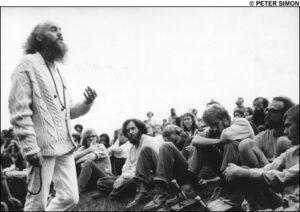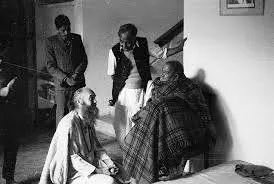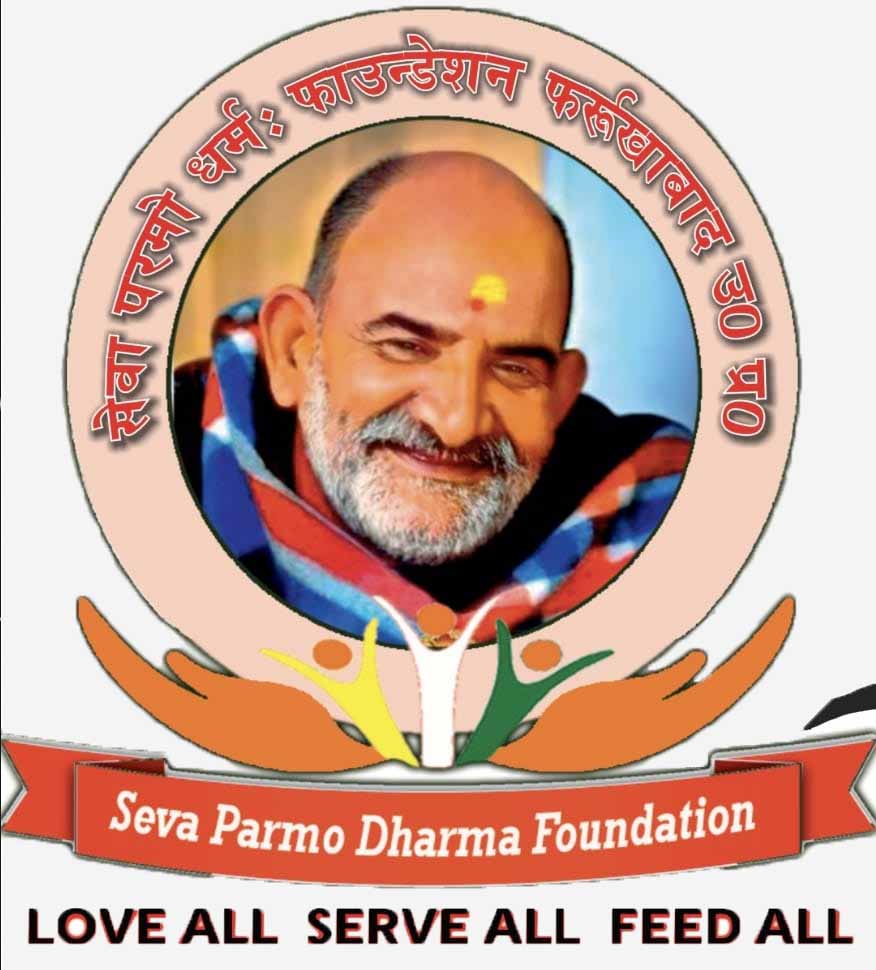The first time you experience unconditional love as
an adult, it may be a gentle melting of a glacier. Or it
may be more of a cataclysm, like a giant earthquake
that shakes you to your inner core. You are falling in
love, but the act of receiving love that intense and
all-encompassing changes your conception of yourself.
You can’t swim in such a vast ocean and remain
entirely in the small pond of your limited self. Even if
that opening is only for an instant, even if it goes
away and is apparently forgotten, that moment of
realization, of the heart opening, colors the rest of a
lifetime. There’s no going back. The lingering taste
of that ultimate sweetness remains and won’t be
denied.
Jesus used the metaphor of a fisherman. When
you first feel that depth of joy, you are caught in the
net of pure love by the divine fisherman; you’re
hooked on that love.
My guru is like a fly fisherman. The ego twists and
pulls and runs out the line trying to escape, but each
time the hook of divine love sets more deeply until
finally the little you, the personality and all its habits,
the bundle of thoughts and desires, surrenders to the
greater Self, that being of pure love and
consciousness that keeps pulling you in to merge.
When Iwas first got to India, I abhorred the idea of
gurus. I was attracted to Buddhism, which appealed
to the psychologist in me. How did I end up sitting in
front of a Hindu guru? When I first met him, I hardly
knew what Iwas doing there myself.
But when Maharaj-ji immersed me in his
unconditional love, it altered the course of my life. My
view of myself completely changed. That meeting
opened my heart. In that moment I opened up to the
guru—not just to the old man in the blanket sitting in
front of me, but to a place within him that reflected
my true Self. That spiritual Self is the source of
unconditional love.
When I returned to the States after that first time in
India, I felt as though I was carrying a precious jewel
in my heart and Iwanted to share it. I could talk about
my heart opening and the new awareness it had
brought. But the guru—I didn’t really talk much about
the guru, because the idea seemed so inappropriate
for the West.
For one thing, there is always a mixed reaction to
the notion of surrendering to another person.
Surrendering in our culture is almost always seen as
negative. We don’t like being told what to do; we like
to figure it out for ourselves. Surrendering means
giving up our power, and it usually has to do with ego
power or sexual dominance.
The term “guru” evokes images of con men and
hucksters rather than spiritual masters. Of course,
we are right to be cynical when we see so-called
gurus get entangled in money, sex, and power.
Seductions, tax evasion, expensive cars, high-priced
mantras—even Hollywood had its fun with gurus and
cults (e.g., The Love Guru). The image of
charismatic corrupters preying on weak-minded
followers is hard to avoid. Most people wouldn’t
know a real guru if they fell over him or her, and
certainly few have ever met one.
At first Maharaj-ji seemed almost like a magical
being to me. He had incredible spiritual powers, but
slowly I began to appreciate that it was the ocean of
his love that had truly hooked me. And that was the
real thing. Here was a flesh-and-blood being who
was living in a state of unconditional love all the time.
That love allowed me to surrender, to accept his
guidance on the inner journey to find that love in
myself.
Later I encountered other beings, some living and
some gone from the body, who helped me see more
of the road map for this path of the heart. These
beings come in all shapes, sizes, and
manifestations, as we all do. They are signposts and
guides to help us on the bhakti marg, the road to
love, even though we each have to travel it ourselves.
Some of the beings who have inspired me are the
Some of the beings who have inspired me are the
ones who have also inspired this book. I hope they
will help you on your way too.
Unconditional love dissolves any rational
hesitation as we become drunk on its sweetness.
We are like moths circling a candle flame,
immolating ourselves in a fire of living love.
LIVINGFLAMEOFLOVE
Oh, living flame of love,
howtenderly you penetrate
the deepest core of my being!
Finish what you began.
Tear the veil from this sweet encounter.
Oh, gentle fiery blade!
Oh, beautiful wound!
You soothe me with your blazing caress.
You pay off all my old debts,
and offer me a taste of the eternal.
In slaying me, you transform death into life.
Oh, flaming lantern!
You illuminate the darkest pockets of my soul.
Where once I wallowed in bitter separation
now, with exquisite intensity,
I radiate warmth and light to my Beloved.
Howpeacefully, howlovingly
you awaken my heart,
that secret place where you alone dwell within
me!
Your breath on my face is delicious,
calming and galvanizing at once.
Howdelicately, howlucidly
you make me crazy with love for you!
—St. John of the Cross,2 translated by Mirabai Starr
Whatever your metaphor (and you can choose—
and mix—your own), whether it’s succumbing to the
softness of the ultimate romance, being submerged
in a tidal wave of love, or being pulled into the
gravitational field of a star, once you have
experienced unconditional love, you have nowhere to
go. You can run, but you can’t hide. The seed is
planted, and it will grow in its own time. You can only
grow into who you truly are.
You may think you’re free to come and go and play
where you will, but the Beloved has taken you for his
or her own, and in reality you can only surrender
more and more to that divine attraction. Slowly but
surely, in a moment or over thousands of lifetimes,
the Beloved reels you in until you merge back into
the unitary state of sat-cit-ananda, the truth consciousness-bliss of the Self.
Be Here Now – Ram dass ji




